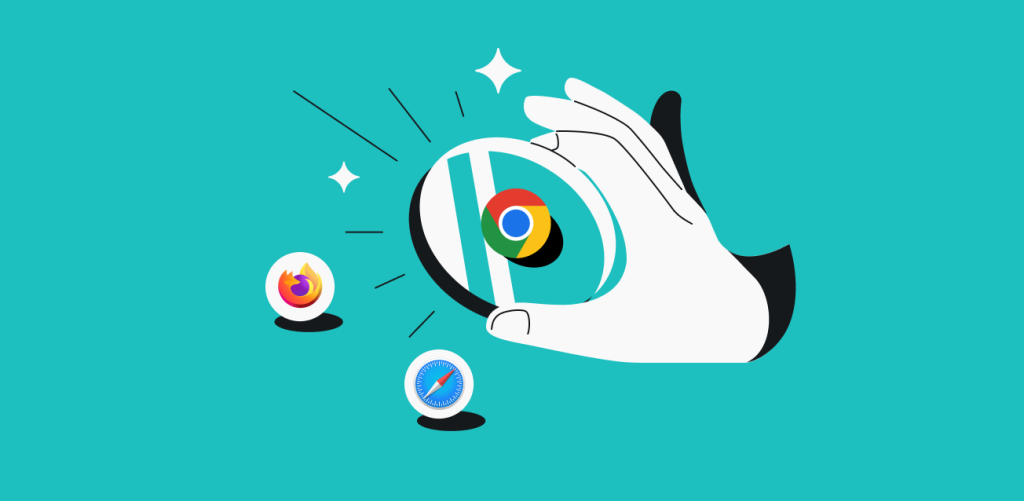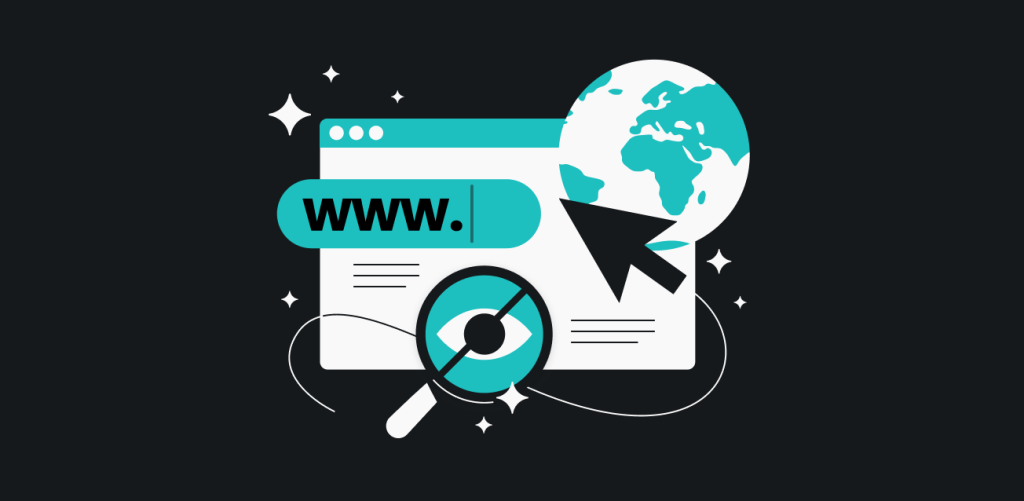
A journey of a thousand gigabytes begins with a single web browser. So, it’s not surprising that malicious actors often try to nip it in the browser bud. To ensure they fail, you must keep your browser’s defenses up to date.
Dedicated browser security tests are the fastest way to find out how secure your browser is. These tests check how well your browser defends against malware and other attacks. Let’s dive deeper and check what threats lurk on the web and what tools show you if your browser’s ready to take them on.
Table of contents
What threats do you face online?
Too many to count. Let’s figure out why you should care about protecting your browser and consider a browser security check. What dangers roam the cyberworld?
Hacking
You know what hacking is — it has a malicious intent to change, steal, or delete data. It’s a big deal, and staying safe isn’t easy. Sometimes you may not even know you’ve been hacked. If your browser isn’t updated with security patches, it may be vulnerable to attacks.
URL manipulation
URL manipulation means changing a URL’s parameters so it shows you a different display page. It is often used to make a link seem like it goes to a real website, but it actually takes you somewhere else. For example, a hacked browser might direct you to fake sites with identical URLs, stealing your personal data in the process.
Tracking
Trackers are used to collect information about your browsing activity. Third-party trackers may also collect sensitive information such as your email address, password, financial information, or social security number. These trackers can sell your data to advertisers and make money off you without you ever knowing. This is called targeted advertising.
Browser fingerprinting
Browser fingerprinting is a technique used to identify you on the internet by your browser’s configuration and various device settings. When you visit a website, it collects information about your device’s software and hardware configurations (the operating system, screen size, installed fonts, plugins, timezone settings, language preference, and more).
These bits of information are stored in a “fingerprint” database. The next time you visit that site — or any other site that operates under the same business model — it will recognize you by this fingerprint.
11 programs to help you test your browser’s security
Some of the sites you visit could be exploiting your browser’s security flaws to steal all kinds of information. Luckily, several types of tools are available to test your browser’s security and vulnerability. Here, we’ll look at some of the best — and what they do.
-
Qualys BrowserCheck
What it is: Qualys BrowserCheck is a cloud service that checks if your browsers and plugins are up to date. This “online checkup” saves you from manually navigating the ever-changing patch notes to decide what you should use. It is compatible with Firefox, Google Chrome, and Edge.
Key takeaway: Best for people who love their plugins and have more than they can count.
-
How’s My SSL?
What it is: As the cheeky founders of this tester put it, How’s My SSL is a cute little website that tells you how secure your TLS client is. TLS stands for Transport Layer Security, a protocol that encrypts communication between web applications and servers — web browsers and websites.
How’s My SSL? rates each client that connects to it. These ratings are not the final word on how secure a TLS client is, but they capture essential security aspects.
Key takeaway: This test is great as it gives you a lot of simplified information with just one visit to their website.
-
Panopticlick
What it is: Panopticlick (also known as Cover Your Tracks) tests and compares your operating system, browser, and plugin settings to a database of anonymous profiles. Then, it creates a uniqueness score that shows how easily you can be identified online. The less unique your browser fingerprint is, the safer you are from tracking.
Key takeaway: Test your browser security with this tool at least once every few months to see how you compare.
-
ShieldsUp
What it is: ShieldsUp tests, monitors, and notifies you of any ports that have been opened via their firewalls or NAT routers. It’s important because all the data from the internet gets into your device via a port — it’s like a door to your computer. And that door can be opened without your knowledge.
Key takeaway: One of the most important tests you can take.
-
Privacy Analyzer
What it is: Privacy Analyzer is a great browser privacy test — it lists the data that websites, ads, and widgets could gather from your browser. If someone malicious gets their hands on such data, they could identify you or follow your activities using IP lookups and fingerprint analysis.
Key takeaway: Knowing what information you’re giving away is essential to protecting yourself.
-
PCFlank
What it is: PCFlank is a browser tester that offers six tests: Stealth Test, Advanced Port Scanner Test, Trojans Test, Exploits Test, Browser Test, and a Quick Test covering the Advanced Port Scanner, Browser, and Trojans Tests. It’s a one-stop-shop solution when testing your browser security.
Key takeaway: A good test if you want to save some time — saves you the trip across different service providers for different diagnostics.
-
BrowserSpy
What it is: Similar to some of the mentioned tools, BrowserSpy shows you what information a webpage can get from your browser — name and version of your browser, fonts you have installed, and what hardware you’re using. This helps you understand what bits and pieces of your privacy can be compromised when browsing online.
Key takeaway: A great tool to learn what information third parties can gather about you.
-
Cloudflare ESNI checker
What it is: Cloudflare ESNI checker performs a quick vulnerability scan on your browser. Privacy can be invaded not only by websites you visit but also by ISPs (Internet Service Providers), public Wi-Fi connections, and more. With this checker, you can at least identify them.
Key takeaway: A great test to take whenever you switch networks.
-
AmIUnique
What it is: AmIUnique is an open-source fingerprint checker. It checks if your browser fingerprint has been in any fingerprint database worldwide (device fingerprinting means various service providers collecting info about your device).
Device fingerprinting isn’t nefarious by design, but it raises some concerns — people aren’t aware of how much of their data is transferred when fingerprinting and who gets hold of their info.
AmIUnique also lets you save your browser fingerprint and has a Chrome add-on that tracks your fingerprint over time.
Key takeaway: A good tool to keep up with your browser’s fingerprint over time.
-
Webkay
What it is: Webkay shows what your browser knows about you and what information it’s ready to give to websites that request your information.
Key takeaway: A simple-to-use security test tool that tells you what information websites gather about you.
-
Firefox Official Plugin check
What it is: The official extension scans for issues and checks for outdated plugins that compromise your safety. Simply update or uninstall these plugins for a better experience online.
Key takeaway: A must-have security extension for Firefox users.
How can you make your browser safer?
To err is human, but to test browser security is divine. The tests above can show countless security threats, but what should you do to fix them? Let’s dive into the steps you can take to protect yourself while browsing.
Send “Do not track” requests to websites
The “Do not track” request is a browser setting that notifies websites and online services that you don’t want to be tracked. It’s an opt-out system, meaning it’s up to the website or service to honor your request.
Some websites and services will comply with it. Others might still collect information about you through third-party advertising networks or other methods. Either way, it’s better to be safe than sorry, so remember to check your browser for the “Do not track’’ setting and turn it on.
Block all third-party cookies
Third-party cookies are small text files that different websites might place on your computer. These sites are often advertisers, social media pages, and web analytics companies. Cookies help the website remember info about you and your visit.
While they can be convenient, the problem is that they track your online activity and can potentially invade your privacy. Third-party cookies don’t just track you, they also enable other sites to show you targeted ads.
Remove all unnecessary plugins and extensions
It can be tempting to install countless plugins to simplify and streamline your online activities. But it’s important to consider what you need, what you don’t need, and how much time you want to spend updating plugins.
So, make sure you are not installing more plugins than you need. With fewer plugins, there’s less chance of any being compromised.
Install privacy extensions or add-ons
If you want extra protection against tracking, consider adding privacy extensions or add-ons to your browser. These extensions or add-ons offer several security features, from protecting your browsing history to blocking ads that track you around the web.
For example, Surfshark offers a VPN extension that hides your IP addresses, blocks ads, trackers and malware, and protects your digital privacy. All in just in one click.
Explore our article and find out more about what you can do with an IP address.
Minimize tracking with a secure search engine
Browser safety extends beyond the choice of the browser. Although they work together, web browsers and search engines are different. Some of the most commonly used search engines track your IP (Internet Protocol) address and online activity. This means knowing where you’re located and what you’ve been doing online.
A secure search engine like Surfshark Search is the best way to avoid this. It doesn’t track or save any of your information. With Search, you won’t need a browser privacy test.
Which browsers are safe and private to use?
We have conducted in-depth research so you can read about the best browser for privacy. For evaluating web browsers, we used privacy and security metrics proposed by Surfshark’s Information Security Team.
Note: we don’t consider private browsing mode as one of the metrics since practically every browser has it.
Brave | Mozilla Firefox | Tor Browser | DuckDuckGo | Vivaldi | Epic Privacy Browser | Waterfox | Iridium browser | Pale Moon | LibreWolf | |
|---|---|---|---|---|---|---|---|---|---|---|
Is the developer a non-profit? | ||||||||||
Does the browser warn you about website add-ons? | ||||||||||
Can you disable loading scripts? | ||||||||||
Does it block fingerprinting? | ||||||||||
Does it block malware/phishing? | ||||||||||
Is it open-source? | ||||||||||
Does it scan downloads? | ||||||||||
Does it have an integrated ad block w/ tracking prevention? | ||||||||||
Can you toggle cleaning history and cookies after every session? |
The takeaway: be proactive about protecting your online privacy
Modern search engines are designed to capture and track your every move. If you aren’t proactive, you’re likely being tracked by advertisers that exploit your browsing data. But you have the right to keep your information private and testing your browser security is a great first step.
Using a secure search engine like Surfshark Search takes it even further by preventing the browser from tracking your information.
FAQ
What is the safest browser?
Tor is specifically known for its security. It also works great with VPN services (often called Tor over VPN), which allows it to heighten your privacy. But any popular browser can be safe with the tools, tests, and steps listed above.
Brave is an excellent alternative to Tor. It offers great security without slowing down your speed. But if you have Surfshark, Surfshark Search feature is one of the safest ways to browse the web.
What info is my browser leaking?
We won’t sugarcoat it — your browser has a lot of information about you that can get leaked, including your IP address, browser type, the device you’re using, the plugins you’ve installed, and even your battery level. With that in mind, we recommend performing a leak test of your IP address, DNS, and WebRTC.
How do I test my browser security?
The best way to test your browser security is to be proactive:
- Send “Do not track” requests to websites;
- Block all third-party cookies;
- Remove all unnecessary plugins and extensions;
- Install privacy extensions or add-ons;
- Minimize tracking with a secure search engine;
- Perform routine security tests with the tools listed in the article.
What is browser security and safety?
Browser security is a general term used to describe internet safety measures that protect web browsers, networked data, and computer systems from breaches of privacy or malware.
This includes using secure protocols like HTTPS, detecting phishing websites and malware, filtering content, updating your browser regularly, managing cookies and privacy settings, using security extensions, and promoting user awareness and education.
The browser is a gateway to the rest of your system; by taking all the steps above, you protect much more than just the browser — you protect the entire device.


